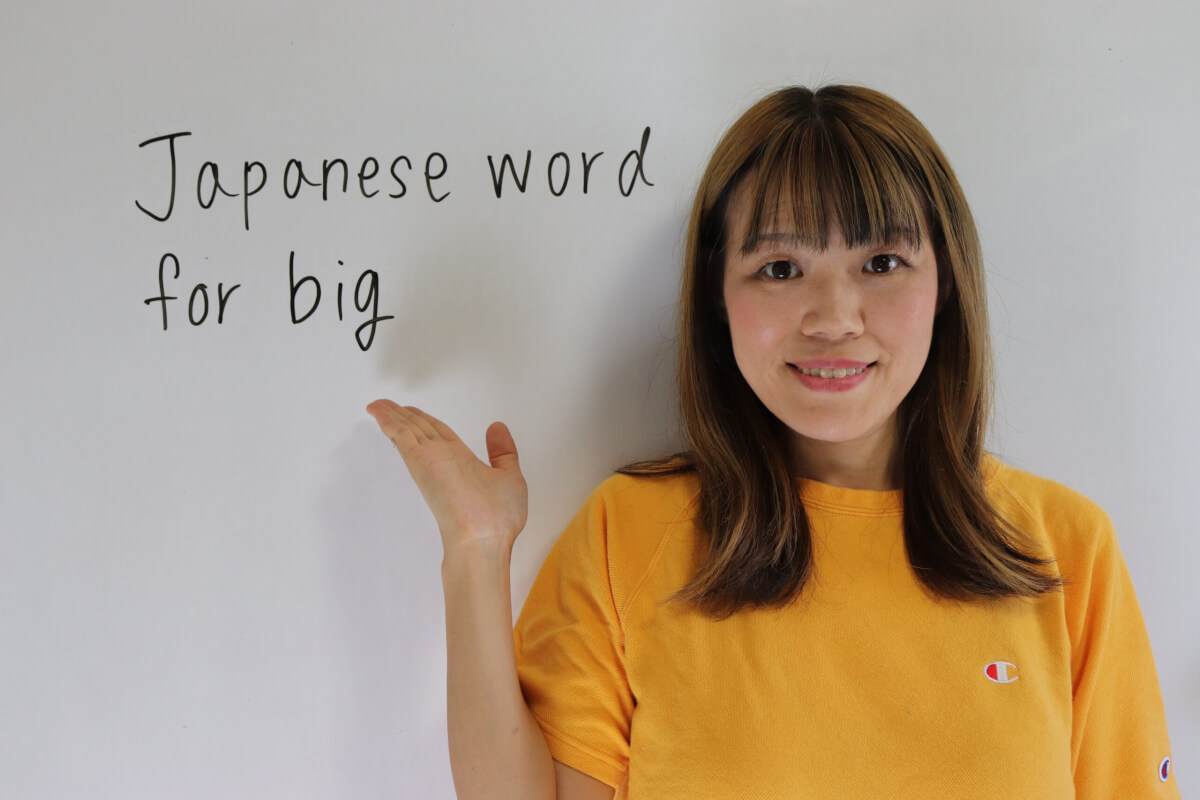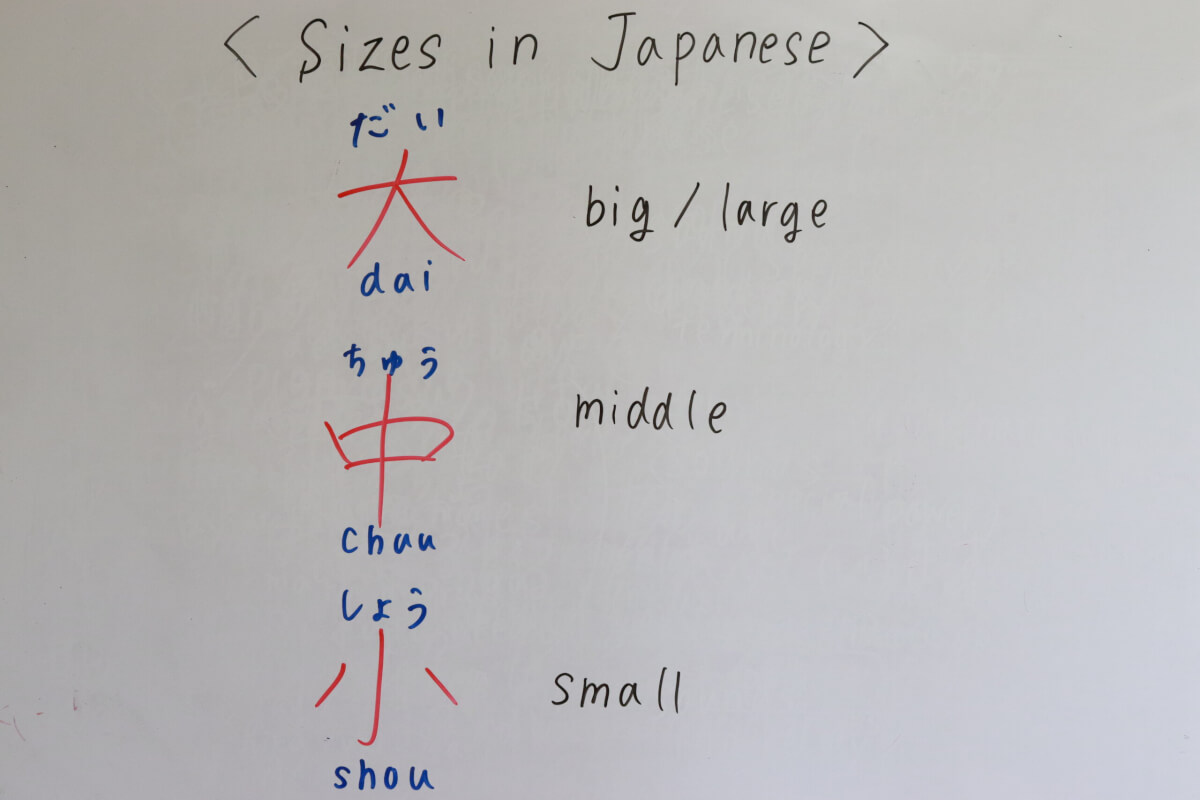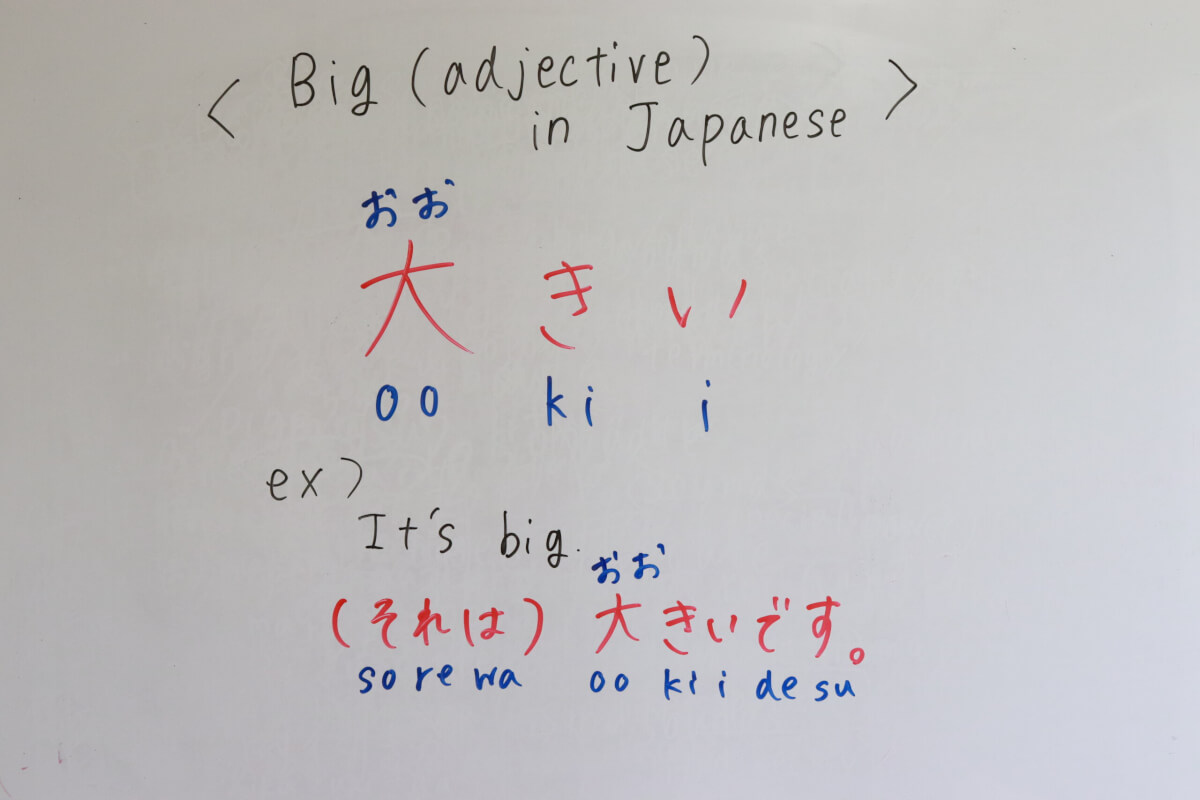- Release Date:
Japanese word for big

Let's study a new Japanese word, big. It is a simple word, but there are many translations. Here is a summary of how it is used.
How to say big in Japanese
Big is used both as an adjective, as in English, and as a noun in Japanese, using Kanji characters. Here are the usages of both.
As a noun "大(だい /dai/)"
Let's look at how "大(だい /dai/)" is used as a noun in familiar situations. In everyday life, "大(だい /dai/)" is often used to indicate the size or amount of things.
"大" in Sizes

"大" is also used to indicate the size of objects or food. For example, when referring to the size of clothes, food, or drinks.
Examples:
大(だい /dai/) big/large、中(ちゅう /chuu/) middle、小(しょう /shou/) small
"大" in the Toilet
In the toilet, "大" and "小" (small) are used to describe the amount or type of waste.
Examples:
大(だい /dai/) number two、小(しょう /shou/) number one
As an adjective "大(おお)きい /ookii/"

When used as an adjective, it is "大(おお)きい /ookii/". Note that the way to say it depends on the tense.
| It is big. | It was big. | It isn't big. | It wasn't big. | big + noun | |
|---|---|---|---|---|---|
| Casual | 大(おお)きいです。 /ookii desu/ | 大(おお)きかったです。 /ookikatta desu/ | 大(おお)きくないです。 /ookiku nai desu/ | 大(おお)きくなかったです。 /ookiku nakatta desu/ | 大(おお)きい or 大(おお)きな + noun /ookii or ookina + noun/ ex) 大(おお)きいリンゴ /ookii ringo/ big apple |
| Polite | 大(おお)きい。 /ookii/ | 大(おお)きかった。 /ookikatta/ | 大(おお)きくない。 /ookiku nai/ | 大(おお)きくなかった。 /ookiku nakatta/ | same as above |
大(おお)きい /ookii/ or 大(おお)きな /ookina/?
The difference between 大(おお)きい /ookii/ and 大(おお)きな /ookina/ in Japanese is subtle but important:
大(おお)きい /ookii/ is an adjective (形容詞(けいようし /kei you shi/) that can directly modify nouns or stand on its own, meaning "big" or "large."
Example: 大(おお)きい犬(いぬ) /ookii inu/ (a big dog).
大(おお)きな /ookina/ is a noun-modifying adjective (連体詞(れんたいし /ren taishi/), which is used only before nouns to describe them as "big" or "large."
Example: 大(おお)きな家(いえ) /ookina ie/ (a big house).
Both words mean "big," but 大(おお)きな /ookina/ is slightly more formal and is only used before nouns, whereas 大(おお)きい /ookii/ can be used more flexibly.
How to translate idioms using big in English to Japanese
There are many expressions using big in English. How would you translate them into Japanese? Here are some examples. Many words do not use the word 大.
Big day
- 大事(だいじ)な日(ひ) /daiji na hi/ (literally important day)
ex) 明日(あした)は大事(だいじ)な日(ひ)です。
/ashita wa daiji na hi desu/
Tomorrow is an important day.
For 大事(だいじ)な日(ひ), 日(ひ) /hi/ day can be replaced to 一週間(いっしゅうかん) /isshuukan/ a week, 月(つき) /tsuki/ a month, or 一年(いちねん) /ichinen/ a year.
- 忙(いそが)しい日(ひ) /isogashii hi/ (literally busy day)
ex) 今日(きょう)は忙(いそが)しかった。
/kyou wa isogashikatta/
I was busy today.
- 大変(たいへん)な日(ひ) /taihen na hi/ (literally tough day)
ex) 今日(きょう)は大変(たいへん)だった。
/kyou wa taihen datta
It was a hard day today.
For 忙(いそが)しい日(ひ) and 大変(たいへん)な日(ひ), 今日(きょう) /kyou/ today can be replaced to 今週(こんしゅう) /konshuu/ this week, 今月(こんげつ) /kon getsu/ this month, or 今年(ことし) /kotoshi/ this year.
Big heart
- 心(こころ)が広(ひろ)い /kokoro ga hiroi/ (literally generous heart)
ex) 佐藤(さとう)さんは心(こころ)が広(ひろ)いですね。
/Satou san wa kokoro ga hiroi desune/
Satou san has big heart.
Big fan
- 大(だい)ファン /dai fan/
ex) 私(わたし)は大谷翔平(おおたにしょうへい)の大(だい)ファンです。
/watashi wa Otani Shohei no dai fan desu/
I'm a big fan of Shohei Otani.
Big changes
- 大(おお)きな変化(へんか) /ookina henka/
ex) 円安(えんやす)は日本経済(にほんけいざい)に大(おお)きな変化(へんか)をもたらした。
/en yasu wa nihon keizai ni ookinia henka o motarashita/
The weakening of the yen has brought about a major change in the Japanese economy.
Big plan
- 大(おお)きなプラン /ookina puran/
ex) 将来(しょうらい)の大(おお)きなプランのために頑張(がんば)っています。
/shourai no ookina puran no tame ni ganbatte imasu/
I'm working hard for my big plans for the future.
Big supporter
- 一番(いちばん)のサポーター /ichiban no sapo-ta-/ (literally the biggest supprter)
ex) 夫(おっと)は家族(かぞく)の一番(いちばん)のサポーターです。
/otto wa kazoku no ichiban no sapo-ta- desu/
My husband is the biggest supporter of my family.
- 大(だい)ファン /dai fan/ (literally big fan)
ex) 私(わたし)はそのアイドルの大(だい)ファンです。
/watashi wa sono aidoru no dai fan desu/
I'm a big fan of that idle.
- 熱心(ねっしん)な支持者(しじしゃ) /nesshin na shijisha/ (literally enthusiastic supporter)
ex) 彼女(かのじょ)は長年(ながねん)、環境保護活動(かんきょうほごかつどう)の熱心(ねっしん)な支持者(しじしゃ)です。
/kanojo wa naganen, kankyou hogokatsudou no nesshin na shijisha desu/
She has been a big supporter of environmental protection for many years.
Big money
- 大金(たいきん) /taikin/
ex) 彼(かれ)はギャンブルで大金(たいきん)を失(うしな)った。
/kare wa gyanburu de taikin o ushinatta/
He lost big money gambling.
Big win
- 大勝利(だいしょうり) /dai shouri/
ex) そのチームは卓球(たっきゅう)の大会(たいかい)で大勝利(だいしょうり)をおさめた。
/sono chi-mu wa takkyuu no taikai de daishouri o osameta/
The team won a big victory in a table tennis tournament.
Big crowd
- 人混(ひとご)み /hitogomi/ (literally crowded place)
ex) 私(わたし)は人混(ひとご)みが嫌(きら)いです。
/watashi wa hitogomi ga kirai desu/
I don't like crowded places.
- 大勢(おおぜい)の人(ひと) /oozei no hito/ (literally many people)
ex) iPhoneの新作発売日(しんさくはつばいび)に大勢(おおぜい)の人(ひと)が集(あつ)まった。
/iPhone no shinsaku hatsubaibi ni oozei no hito ga atsumatta/
A large number of people gathered for the launch of the new iPhone.
Big improvement
- 大幅(おおはば)な改善(かいぜん) /oohaba na kaizen/ (literally significant iprovement)
ex) その会社(かいしゃ)は大幅(おおはば)な改善(かいぜん)が必要(ひつよう)です。
/sono kaisha wa oohaba na kaizen ga hitsuyou desu/
The company is in need of significant improvement.
